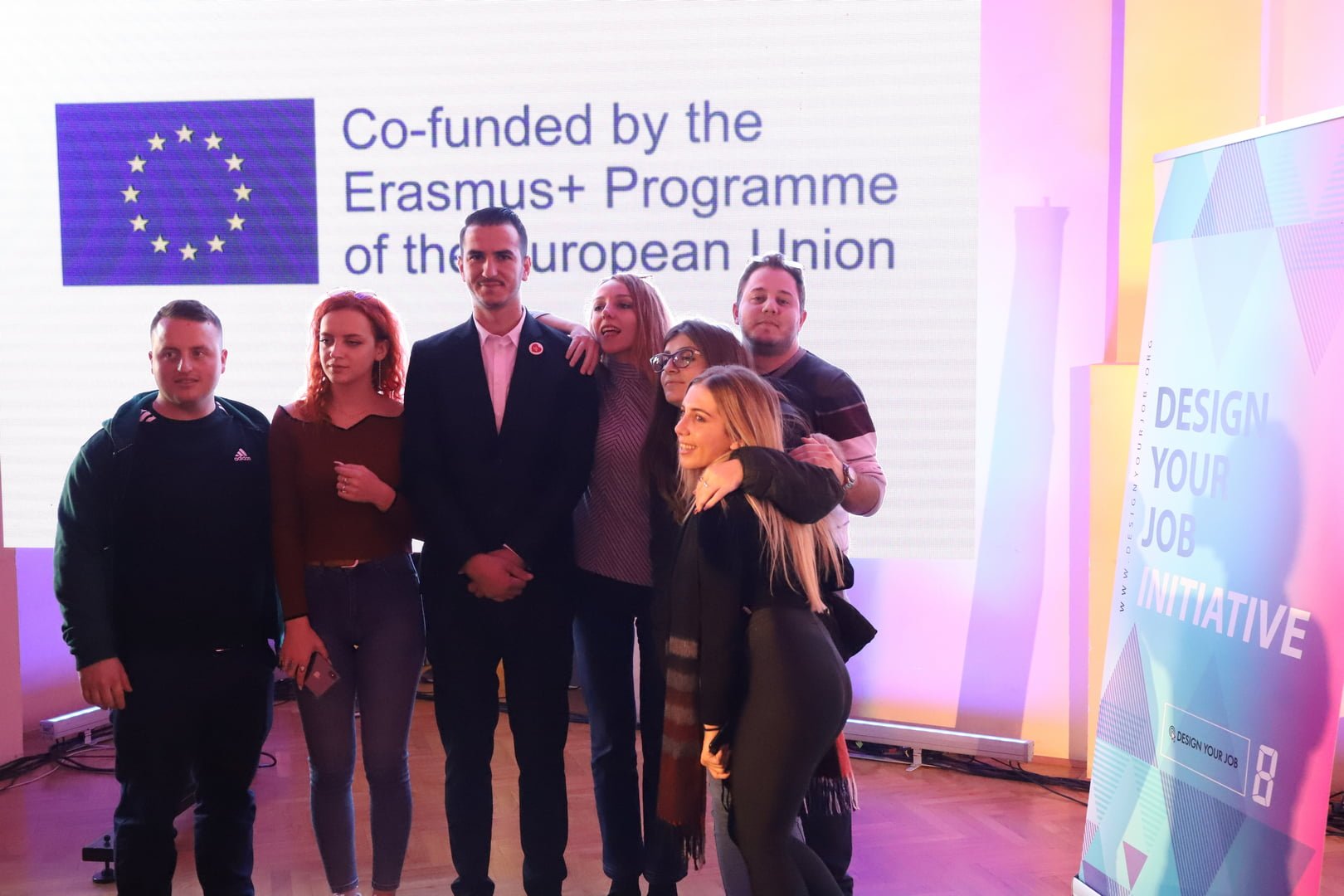
In the Western Balkans, unemployment rates among young people are some of the highest in Europe – varying from 28.3% in Albania to 55.4% in Kosovo (Eurostat 2018). Yet, on the other side of the equation, there remain many unfilled jobs. One solution lies in upskilling young people through training courses that focus on specific, in-demand skills required. This was the approach taken by Serbian youth organisation, ‘RES POLIS’ (Center for Youth and Social Development), specialised in developing non-formal education paths to empower young people.
“We were witnessing a paradox in Serbia,” explains Boris Negeli of RES POLIS. “On the one hand, we had a high unemployment rate, but on the other, the IT sector had a critical deficit of skilled workers. For us, the solution was simple: the National Employment Service, responsible for the training of unemployed individuals, should also include ICT training within their education programmes.” This was the inspiration behind the ‘Design Your Job’, initiated by RES POLIS back in 2009. The goal was to develop and test ICT educational programmes in areas where there are talent shortages.
Since then, ‘Design Your Job’ has grown from strength to strength. It is supported by the European Union’s ERASMUS+ programme, which promotes cooperation in education, training and youth work, including in the Western Balkans. The project includes partner organisations from France, Italy, Albania and Cyprus who all bring different expertise. As many countries across the Western Balkan region and beyond face similar challenges, this sharing of experience is vital.
Training courses have been developed in fields as diverse as graphic design, web design, programming to 3-D modelling and basic game animation. Anyone between 18 and 30 years old is eligible, with young people from disadvantaged groups particularly encouraged to apply. To gain international experience, successful candidates carry out their training in one of the partner countries.
“On the one hand, we had a high unemployment rate, but on the other, the IT sector had a critical deficit of skilled workers. For us, the solution was simple: the National Employment Service, responsible for the training of unemployed individuals, should also include ICT training within their education programmes.”
Boris Negeli, RES POLIS
Breaking the vicious circle
Eriseld, 26, from Albania, is one of a number of young people who applied for a training course. “Although I have a degree in Information Technology, I had to work in a factory instead of an IT-related job in order to make a living,” he says. Eriseld explains that while he was taught a lot of theory at university, he had little practical knowledge.

“My job prospects changed when I heard about ‘Design Your Job’. It was just what I needed.”
Eriseld Kosta
This led to a vicious circle – he needed experience to get a footing on the career ladder, but was unable to gain experience without first getting hired. “However, my job prospects changed when I heard about the ‘Design Your Job’ initiative. It was just what I needed,” Eriseld says.
Eriseld participated in two 10-day training courses as part of the ‘Design Your Job’ initiative in Serbia and Italy, which equipped him with new skills and insights from abroad. Soon after, he received a job offer from InTech – a Tirana-based IT company where Eriseld had completed his practical training during the project. After gaining some work experience, from there Eriseld decided to take the plunge and go freelance, offering IT services for local and international clients. His plans for the future include starting his own company and employing other people.
Looking forward
Demand continues to grow, and RES POLIS always keep one eye on the future. The programmes are regularly evaluated to make sure they are equipped to address challenges facing the ICT business sector over the long term. Ultimately the goal is that their tried-and-tested ICT education programmes will eventually be incorporated into the National Employment Service training portfolio for the unemployed.
Photo Credits: Ervin Kurti, Nikola Radman
Since then, ‘Design Your Job’ has grown from strength to strength. It is supported by the European Union’s ERASMUS+ programme, which promotes cooperation in education, training and youth work, including in the Western Balkans. The project includes partner organisations from France, Italy, Albania and Cyprus who all bring different expertise. As many countries across the Western Balkan region and beyond face similar challenges, this sharing of experience is vital.
Training courses have been developed in fields as diverse as graphic design, web design, programming to 3-D modelling and basic game animation. Anyone between 18 and 30 years old is eligible, with young people from disadvantaged groups particularly encouraged to apply. To gain international experience, successful candidates carry out their training in one of the partner countries.
Breaking the vicious circle
Eriseld, 26, from Albania, is one of a number of young people who applied for a training course. “Although I have a degree in Information Technology, I had to work in a factory instead of an IT-related job in order to make a living,” he says. Eriseld explains that while he was taught a lot of theory at university, he had little practical knowledge.

This led to a vicious circle – he needed experience to get a footing on the career ladder, but was unable to gain experience without first getting hired. “However, my job prospects changed when I heard about the ‘Design Your Job’ initiative. It was just what I needed,” Eriseld says.
Eriseld participated in two 10-day training courses as part of the ‘Design Your Job’ initiative in Serbia and Italy, which equipped him with new skills and insights from abroad. Soon after, he received a job offer from InTech – a Tirana-based IT company where Eriseld had completed his practical training during the project. After gaining some work experience, from there Eriseld decided to take the plunge and go freelance, offering IT services for local and international clients. His plans for the future include starting his own company and employing other people.
Looking forward
Demand continues to grow, and RES POLIS always keep one eye on the future. The programmes are regularly evaluated to make sure they are equipped to address challenges facing the ICT business sector over the long term. Ultimately the goal is that their tried-and-tested ICT education programmes will eventually be incorporated into the National Employment Service training portfolio for the unemployed.
Photo Credits: Ervin Kurti, Nikola Radman
Please wait while your video is being uploaded...
Don't close this window!